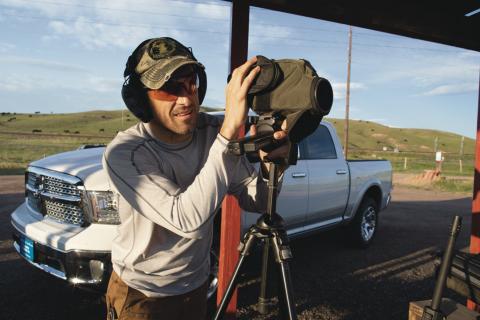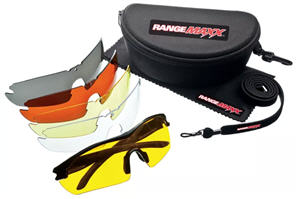
It is just about automatic for shooters to don both eye and ear protection before embarking on a session at the rifle range or skeet/trap field; in fact, it's mandated at organized shooting facilities. In addition, more and more hunters are wearing hearing protection in the field, especially using devices that not only protect from loud gunshots but also enhance hearing of low-level animal sounds. As we know, hearing damage is permanent, so we really need to do all we can to protect this precious sense.

But seeing a hunter wearing eye protection in the field is not a common sight. Yes, some upland bird hunters will wear shooting glasses, but it seems to be an ignored precaution for waterfowlers, turkey hunters and certainly for big game hunters. Do we value our sight any less than our hearing?
Tip: Shooting glasses not only protect your eyes, but they can also help you spot game.
I decided to write this blog because I've recently heard a number of horror stories of eye injuries, or near-misses, suffered by hunters in the field. Mostly I heard stories of dove, duck, pheasant, quail and turkey hunters being struck in the face with errant bird shot. Those that were wearing shooting glasses escaped serious injury; the hunters that weren't wearing glasses were not so fortunate.

Tip: Champion Range & Target offers the Over-Spec Ballistic Glasses are built to fit over standard prescription eyeglasses. High-quality shooting glasses that won't distort your vision and meet demanding MIL-PRF-31013 3.5.1.1 standards for ballistic resistance.
While the sheer number of such stories shocked me, I was not surprised to hear that such accidents do happen. But what did surprise me was the number of incidents of hunters being struck in the face or eyes by tree branches or twigs while walking through the bush. Again, those that were wearing glasses suffered only minor facial scratches, or no injuries at all, but many of those that had no protection suffered serious and even permanent eye injuries. If that's not enough to convince hunters that wearing shooting glasses in the field is a good idea, there is another reason.

Glasses
Much the way that some hearing protection devices can also help you hear approaching game, some shooting glasses can help you spot game. Clay shooters have long realized that different colored lenses can help shooters see clay pigeons easier under varying light conditions, but hunters can take advantage of this as well.
Yellow and Vermillion lenses, in particular, can enhance a hunter's vision under certain conditions, and many models of shooting glasses come with a number of interchangeable lenses to match conditions that can range from bright and sunny, to overcast and flat, to snow-covered and high-glare. By using the correct high-contrast lenses to suit the conditions, hunters can spot their quarry easier, whether chasing pheasants in snowy corn fields, pass shooting doves in bright skies, or decoying ducks into flooded timber or rainy marshes.
Use This Infographic About Shooting Glasses to Help You Understand Their Importance

Like our hearing, our eyesight has to last our entire lives, so a little protection from the various dangers that eyes may encounter while hunting makes a lot of "sense."
Good hunting.
- 6948 views

